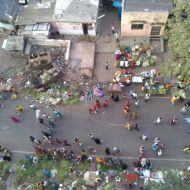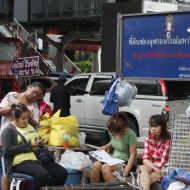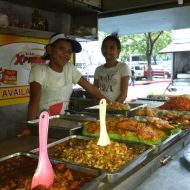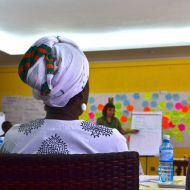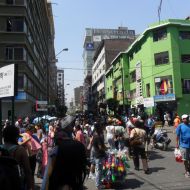It’s Time for Accra to See the Informal Realm Not as a “Sector,” But as People
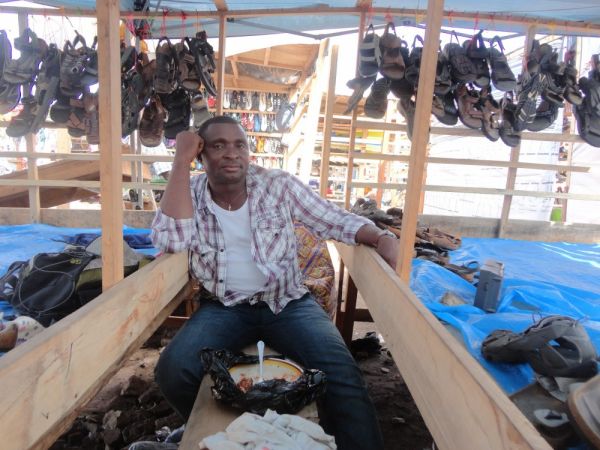
An informal trader at Kantamanto market.
“Africa is people!”
Three words, the central, frustrated and hopeful thesis of Chinua Achebe’s final compilation of essays. As I read his essays, I kept thinking, “And also, Accra is people, and ‘informal Accra’ is people.”
This is obvious, of course. But the obvious is sometimes easy to overlook, a point I’ll get back to.
It’s not easy to summarize or characterize informal Accra. It’s such a large group of people with such diverse livelihoods. But with the help of a couple of the people thinking about Accra’s future, I can point in a few directions.
The Labyrinth of the Informal
Informal Accra is a fascinating place, as labyrinthine as its markets. And like any labyrinth, as you explore it more and more often, it slowly becomes familiar. Patterns emerge. Context takes shape. Everyday objects take on new significance, become guides and signposts. Stacks of yellow jerry cans are given a name — the Kufuor Gallon – and a significance – a citywide water delivery failure. A puddle of mud is a would-be football pitch, evidence of inadequate drainage and little planning for public play. A woman selling water from a head pan is a symbol of the lack of formal sector employment and an indication that clean, potable water is a hot commodity. People sleeping in the historic streets of Jamestown point to land rights and an unfocused housing policy.
Informal workers and residents of informal settlements are also the majority. “Anecdotally,” says former Accra Mayor Nat Amarteifio, “I’m told that more than 60 percent of this city lives in informal cities… The so-called consumers of the informal sector far outnumber the consumers of the formal sector.”
Blurred Lines
But of course there is the problem of “informal” as an idea. What is informality, anyway? If a market woman is selling sandals on a little patch of sidewalk in a place not zoned for such activity, is that informal? What if the municipal authorities collect a daily or weekly tax from her? What about the fact that she’s paid rent to the land owner for that space? How “informal” is her business, really?
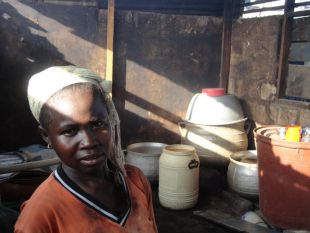
A young informal beer brewer.
Then, too, the formal sector uses and relies on the informal. As individuals, our lives are usually some combination of both. There’s the corporate employee who pays the expected bribes when pulled over, who buys plantain chips in traffic from an informal street vendor. A government worker who drives an illegal motorcycle taxi at night. A retired teacher – a public servant – who now lives in a slum. A worker who participates in an informal savings group that uses a bank’s services for the collective.
Private companies recognize the informal sector’s ubiquity and power and use it strategically. The telecommunications companies and sachet-water manufacturers use the extensive penetration of the informal sector – a wholesale and distribution infrastructure in its own right – to sell their products. Banks and beer manufacturers have realized the saving and spending power of the informal sector and target products and services to them.
Ingenuity, Hope and Resilience
Much of the informal sector’s activities involve finding ingenious workarounds for dysfunctional or inadequate public services. But the informal sector also represents hope — hope for a better life. That’s why Accra is so attractive to migrants from rural communities and neighboring countries. “These [young people] are just as rational as you and I,” says Dr. George Owusu, a geography professor at the University of Ghana. “They’ve witnessed how their grandparents have fared. They see how their parents are faring. They want to try something different.”
“These are individuals who aspire for better things,” he says. “Life in the city can be a stepping stone for prosperity.”
This is why when I spoke with women who’d suffered from fires burning through their market, returning to the village was the last resort. We want to rebuild and start over, was the story I heard over and over, in spite of losses and deep setbacks. This is the refrain. Rebuild. Start over. Keep trying. Yen ko. (Let’s go.)
Voice, Power and Its Limits
“Welcome to our slum,” Kende Yusseif said to me once when she and Sammy were showing me around Agogbloshie. “Nima is only gutters,” the young Miriam told me as we cut through the tiny walkways interlaced with them.
They are well aware of their problems. And they are working to address them. There is far more organization within the informal sector than you might expect. Market leaders have trade associations that advocate for their interests, borrow money collectively, make rent deals. People like Sammy are deeply invested in regulating and helping their communities. Sammy lobbies government to put in proper drainage, is working with an NGO to set up skills-training centers for the youth there, about whose futures he is deeply worried. Professor Owusu told me that the community leaders in Old Fadama, the most notorious slum in Accra, have put a moratorium on new wood buildings because of the occasional fires that sweep through these places.
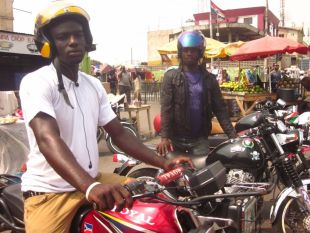
Informal motorcycle taxi drivers.
In addition to these community and individual actions, advocacy organizations – Housing for the Masses, the People’s Dialogue, Global Communities, and many others – are pushing for reform. And yet these communities struggle to get a hearing in the arenas of power. The municipal authorities regularly raze informal markets. Good work is being done by many people in both the formal and the informal sectors in service of creating a more liveable and inclusive future for Accra. The national government has adopted well-founded policies, especially with the new Ghana Urban Policy Framework. These shifts in ideology, though, according to Owusu, haven’t filtered through to municipal executives, who are, in all fairness, starved of promised funding from the national government. The political will to take the informal seriously doesn’t seem to be quite there yet. Why?
An Attitude Problem
In one of the ICD workshops, I noticed a young lady wearing Heel The World beads, a fashionable marker of middle-class consciousness, around one wrist. During one of the conversations, she said of informal vendors who encroach on the sidewalks around Accra Mall, “We have to tell them that what they are doing is wrong.”
This attitude, to me, is a failure of imagination. The street vendors set up shop there because that is where there is business and foot traffic. They sell cheap Chinese products – another common complaint – because they don’t require much capital and there is a market for inexpensive items. They don’t have many other options. The “wrongness” of their actions is highly subjective; they are deemed an eyesore and a nuisance, and what happens to them after the city sweeps their shops away is deemed hardly worth considering. “Our idea of dealing [with informal settlements] is to move them as far away from the public gaze as possible,” Amarteifio says. But, “They want to be close to their places of work.”
This young lady’s attitude is not unusual. She is not a bad person. She simply didn’t see the realities of these people’s lives. “Defining something as informal puts it into a second class,” says Amarteifio. “Unfortunately, the people who make these definitions are in the formal sector.”
But as I meet more and more people who live lives dominated by informality – slum dwellers and informal traders – I find interesting, kind and warm people who are, of course, people. In our zeal to create a beautiful and efficient city, just as Achebe reminded the world’s bankers how their experiments with structural adjustment in Africa were designed to create beautiful and efficient economies, we must not forget that the informal sector, too, is people.
The Informal City Dialogues have helped to open up a conversation about informality in Accra. They’ve opened up the lives of people in the informal sector, and has asked them to be part of imagining a better Accra. But that conversation cannot stop here. It must be a consistent dialogue that begins to create a sense of the “collective consciousness” that Amarteifio believes is missing from the city.
Listen to Their Songs
I had a recent chance encounter with an East African professor from an elite American college, and he told me an interesting story. A well-known development expert once told him about a project of his that had been going very poorly. The professor says he asked the development expert, “Have you listened to the people’s songs?” (He had not.)
In Accra, you might well ask if you’ve listened to their proverbs, often found in winding contests of wisdom and wit the Akan, Accra’s most populous ethnic group, are famous for. You might also listen to their call-and-response dialogues. The one, from the Ghana Federation for the Urban Poor, stings me the most:
Call: “Homeless!”
Response: “But not hopeless!”
Just there, in those two lines, you have a poignant statement of a problem and the seed of a solution.
Start asking questions about statements like these and and the problem will unravel, the solutions become more clear. Every slum has its own history, every trade its story. It is through the consistent sharing of these narratives and working toward compromise that Accra has a chance grow into a more inclusive city rather than a more bifurcated, divided and unequal one.
Coda: (Informal) Accra is People
Informal Accra is Miriam, who showed me how she fetches water each day before going to her informal apprenticeship in sewing. It is Alice, who sells barely enough sachet water each day to get home and back. It is Eric, who is rebuilding his business selling Dickies at Kantamanto. It is Sammy, who loves his community with more warmth than I’ve ever seen in one person. It’s Pascalina, the kayayoo (head porter) who calls me now and then just to say hello.
I want to thank all of them – and the many more who spoke with me over the course of the Dialogues. They and their communities deserve better. I know they will work hard to make that happen. I just hope someone will be listening.
Photos by Sharon Benzoni


